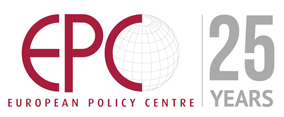(18 September 2023, European Policy Center – EPC)
Speakers:
- Anna Caprile, Policy Analyst, Directorate-General for Parliamentary Research Services
- Benjamin Hilgenstock, Senior Economist, KSE Institute & Member of the Yermak-McFaul International Expert Group on Sanctions
- Nataliia Shapoval, Vice President for Policy Research, KSE & Member of the Yermak-McFaul International Expert Group on Sanctions
- Torbjörn Becker, Director of the Stockholm Institute of Transition Economics (SITE), Stockholm School of Economics
- Tymofiy Mylovanov, President of the Kyiv School of Economics (KSE), Associate Professor at the University of Pittsburgh & Former Ukrainian Minister of Economic Development, Trade, and Agriculture
- Vladyslav Vlasiuk, Advisor, Head of the Office of the President of Ukraine & Secretary of the Yermak-McFaul International Expert Group on Sanctions
Moderator:
- Svitlana Taran, Research Fellow, European Policy Centre and KSE
The aim of the conference organized by EPC was, above all, to provide an overview of the sanctions imposed on Russia since the start of the war, to assess their effectiveness, and to determine the criteria on which future decisions should focus to continue weakening Russia and prevent it from financing the war in Ukraine.
What Has Been Done So Far?
Over the past 18 months, Russia has faced 11 rounds of sanctions aimed at undermining its economy and, consequently, its military-industrial complex. These sanctions encompass various sectors, including energy (oil, gas, and coal), measures targeting Russian propaganda media in Europe (such as Russia Today), an arms embargo, and banking restrictions.
Anna Caprile presented a review of these 18 months in three categories:
- Revolution for the EU: These different sets of sanctions represent a revolution for the EU on several levels. Firstly, due to the intensity and rapidity of the measures taken. Secondly, because this war has completely reshaped the way sanctions are imposed within the EU. Sanctions are now clearly the initiative of the Commission, which is a completely new way of approving measures. The sanctions imposed have also completely transformed and speeds up the political agenda, including major issues like the Green Deal.
- Unity: This transformation is evident due to the number of stakeholders involved, meetings held, and decisions taken.
- “International” but not “global”: It’s important to emphasize that it’s an “international” effort, not a global one, to clarify that the EU still faces certain foreign policy challenges. Some states are against the imposition of sanctions as a foreign policy tool.
What Are the Main Challenges?
All the speakers unanimously agreed on the effectiveness of the sanctions and their significant impact on the course of the war, despite Russian propaganda’s claims that the sanctions are ineffective. The panel also emphasized the ‘dynamic’ nature of sanctions, signifying their lasting impact over time, beyond just their initial implementation, underscoring the importance of consistency. When imposing sanctions, it is necessary to anticipate that Russia will always seek ways to circumvent them. Therefore, it is essential to stay ahead by implementing more aggressive and strategic measures, as advocated by Timofiy Mylovanov.
Anna Caprile, Nataliia Shapoval, and Benjamin Hilgenstock also highlighted several critical concerns when considering sanctions. One of these concerns revolves around the reliance on specific materials and the necessity for the sanctions coalition to secure supplies despite the imposed sanctions. This situation prompts a series of inquiries, including the need to procure metal (titanium for example) from Russia, a vital material for some nations, and the imperative to collaborate with contentious partners such as Azerbaijan to diversify supply sources. These challenges underscore the EU’s lack of autonomy in various domains, notably in the energy sector.
What Measures Should We Strengthen or Implement?
Energy-related measures are crucial as Russia continues to rely on these exports to fund its military budget. Despite the significant impact, these revenues remain substantial. For instance, the price of a barrel of oil, which was $40 in January, has steadily risen since.
According to Benjamin Hilgenstock, a significant challenge lies in the violation of the price cap imposed on Russian oil. Instead of implementing tariffs on Russian oil, policymakers have opted for the introduction of price caps. These caps establish a maximum price at which Russian oil can be traded in international markets. If the price of Russian oil surpasses this limit, it becomes more challenging for Russia to sell its oil at elevated rates, thereby restricting its revenue potential. The EU has introduced exemptions within its embargo framework, permitting Western shipping companies and marine insurance firms to engage in trade with Russian oil as long as prices remain below the stipulated ceiling. This approach ensures the continued availability of Russian oil in the market but at controlled
prices. However, we are now witnessing instances of sanctions violations, accompanied by a surge in the price of a barrel of Russian oil.
Consequently, there is a pressing need to enhance transparency among companies involved in these transactions (need to implement clear and regular audits, list of trusted companies…). According to Torbjörn Becker, there is a call to curtail commercial interactions across various sectors and provide clearer directives to companies, instructing them not to engage in such trade. This approach, as advocated by both Benjamin Hilgenstock and Torbjörn Becker, is expected to persuade political decision-makers to adopt more stringent measures.
Vladyslav Vlasiuk also emphasized the importance of considering Russia’s propaganda machine. He stated that even if the war were to end now, this weapon is very much real. Continuing to impose sanctions is vital to maintain isolation and weaken the influence of propaganda.
Video recording of the event:

